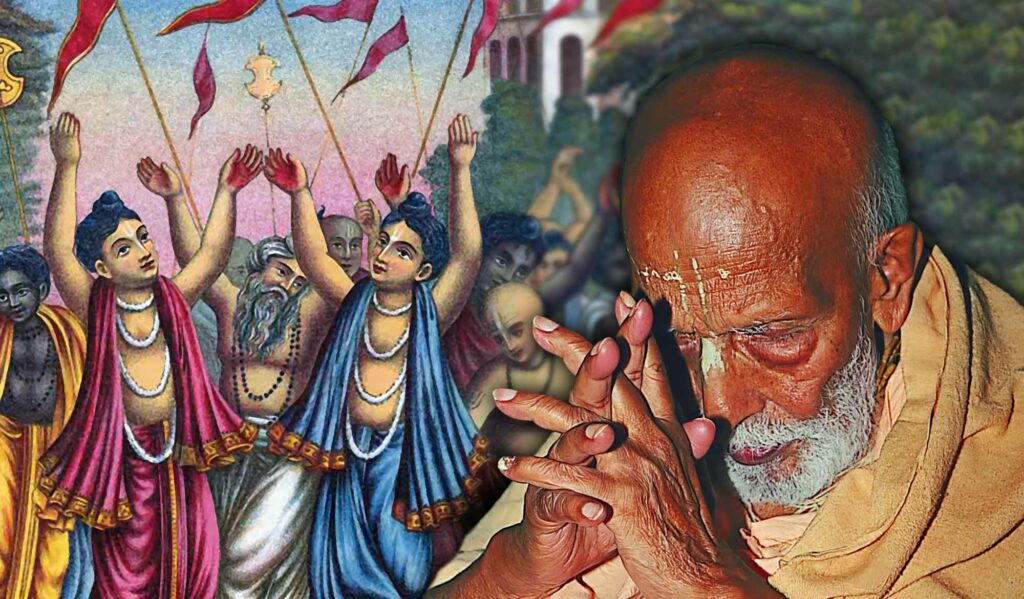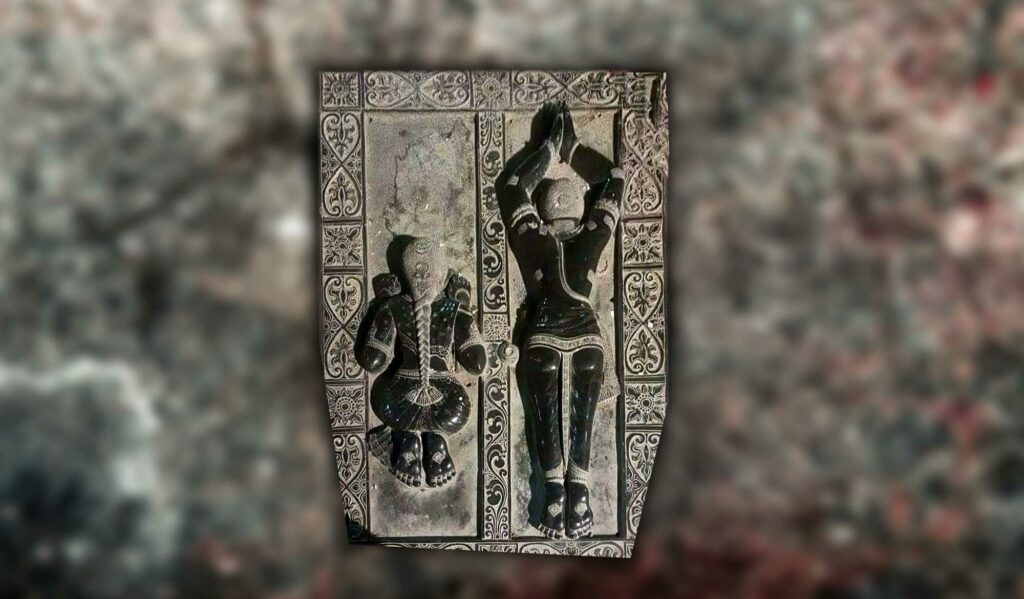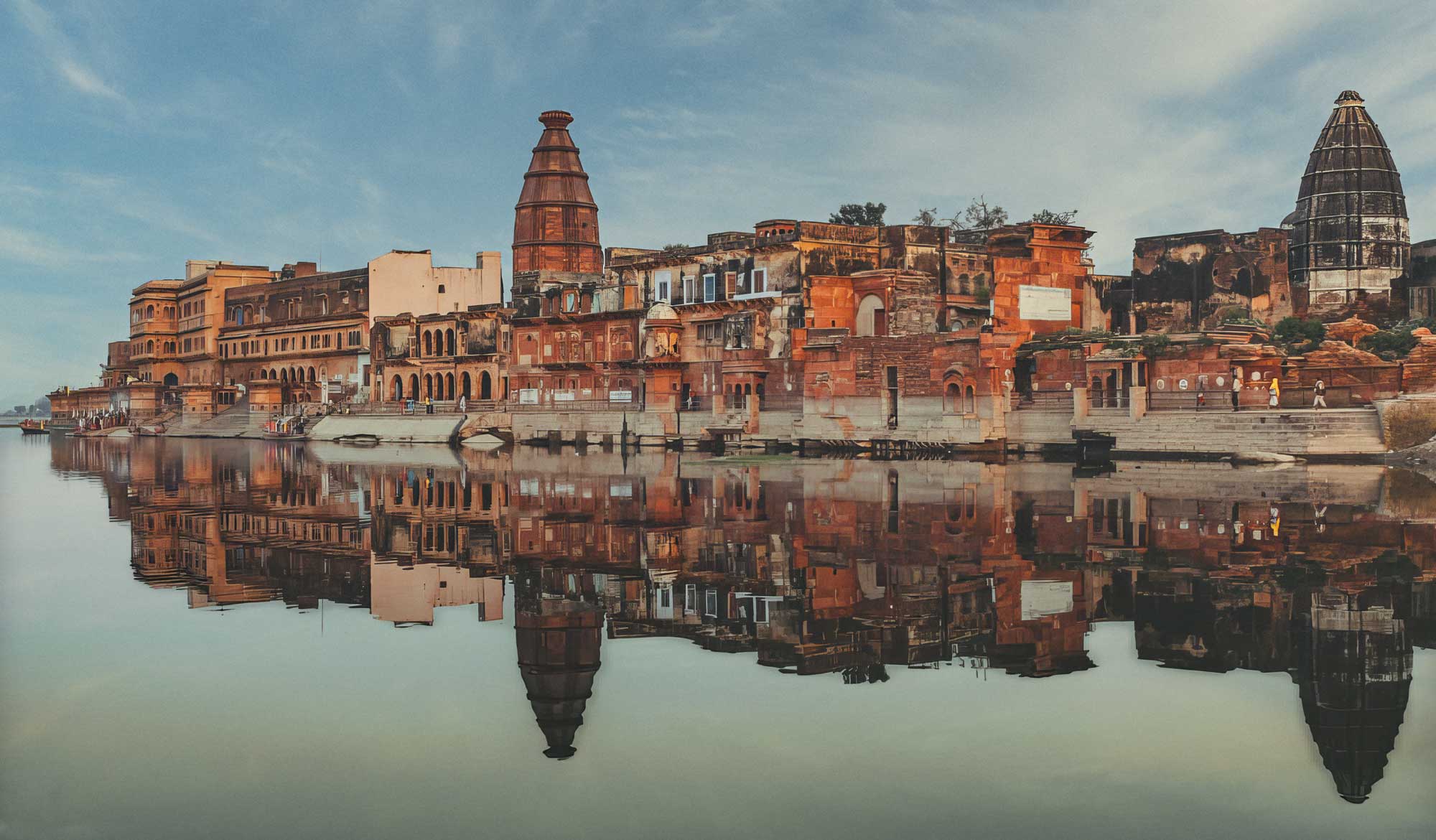Overview
In this article, "Ātma Samīkṣā – The Value of Introspection" Kalki Dāsa highlights the importance of introspection in the life of a devotee and especially in relation to the worldly environment that surrounds us. He also explains how transcendental sound influences our capacity to introspect.
The human form of life is a rare opportunity. The capacity to rise above the demands of the senses and question the self is only afforded to humans, and is what truly separates this form of life from millions of other species. The roots of the word human can be traced back to the Sanskrit, mānuṣya — a composite of the words māna (meaning the mind), and iśa (one who can control). Being aware of this unique advantage, members of the Vedic civilisation have incorporated meditation and other such disciplines into their daily lives as part of a thriving spiritual culture.
Today we find ourselves in an environment which is in stark contrast to the civilisation of our ancestors. Although in India we find much of the ancient spiritual culture still being practiced, we cannot deny how modernisation has changed the face of the world, demanding we adjust to these circumstances and apply the timeless process of self-realisation to the present age.
We can all attest to the power of the many new forms of technology (social media, artificial intelligence, various streaming platforms etc.) and their ability to attract, and hold our attention. For spiritual practitioners these emerging technologies present new opportunities to research, as well as broadcast positive messages on an unprecedented scale. At the same time these tools can become a huge distraction if we do not exercise self-control, what to speak of the many falsities being propagated through these mediums, and the conditioning effect they have on us. To avoid falling victim to the barrage of content being daily flooded into our minds by the algorithms, and our inability to sort through that sheer volume of information, we are in need of a positive solution which will help us step back and regain our footing.
As we enter onto the path of self-realisation, it may seem like so many ordinary things are taking place in our lives. We may have to work a mundane job, pay the bills, and have little time to devote to spiritual practices. We may feel discouraged by how far away the goal seems, and the obstacles we are facing at present. However, when we are able to truly reflect on what we’ve been given, the world around us begins to take on a new colour, and seemingly ordinary things reveal themselves to be divinely connected.
Provided we take an optimistic stance, the environment we find ourselves in can help us a great deal in taking a step forward even if what we’re facing is difficult to accept. In the Śrīmad Bhāgavatam we find the evidence for this in one of the favourite verses of Śrīla Śrīdhara Mahārāja,
tat te ’nukampāṁ su-samīkṣamāṇo
bhuñjāna evātma-kṛtaṁ vipākam
hṛd-vāg-vapurbhir vidadhan namas te
jīveta yo bhakti-pade sa dāya-bhāk
My dear Lord, one who earnestly waits for You to bestow Your causeless mercy upon him, all the while patiently tolerating the reactions of his past misdeeds and constantly paying respects unto You with his mind, body and words, is certain to attain your lotus feet, the object of all devotion. (Śrīmad Bhāgavatam 10.14.8)
We have to accept our environment in such an optimistic way, not in a reluctant way. Even if the circumstances seem to be averse to me, that should be faced. We are face to face with our friend and not an enemy. We have to welcome any adversity with this spirit, then it will immediately change its face. This is the highest type of medicine, to face danger as a friend. The first state is to accept that this is my own earning, none to blame for this. The second state is that it is the real necessity at this stage, the real medicine to uplift me, because no event can come without the sanction of the Absolute. Without His sanction, no movement is possible and He is a friend and an affectionate Guardian, through Whose hand everything is passing to me. Tat te’nukampāṁ – not to blame the circumstances, but to appreciate that it is He at the back. As my best friend, He is behind everything. Everything is passing through His attentive eyes, so there cannot be any defect there. (Śrīla Śrīdhara Deva Gosvāmī Mahārāja)
If we are able to introspect (ātma-samīkṣā), and embrace such an outlook, then we are well on our way towards transcending this illusory world. To illustrate how we can start to apply this in our lives, Śrīla B.G. Narasiṅgha Mahārāja gives one example,
One man is washing windows to support his family. Another man is washing windows, he’s supporting his family but he’s always thinking that this energy that he’s in, ‘Who’s energy is this? What is the purpose of life?’ He’s always churning spiritual thoughts in his mind. So then that so-called drudgery of washing the window, that also becomes spiritualised… not fully spiritual, but ‘spiritualised’, ‘Kṛṣṇa-ised’.
Introspection can be applied to even the most mundane activities. This implies, of course that we are absorbing ourselves in spiritual sound vibration in the first place, and not just the worldly banter of so many podcasters, online influencers, and life coaches. As even a drop of water can wear away at stone, we may be amazed to witness how even a small amount of daily hearing from Bhagavad-gītā and other such literature can transform our consciousness.
But beyond just ‘spiritualising’ our mundane lives, the process of śravaṇam (hearing transcendental sound) is so powerful that it can even lead to perfection, provided that one applies careful reflection to what he or she is hearing. In Śrīla B.P. Purī Mahārāja’s The Art of Sādhana, he references the account of a devotee named Gokarṇa who recited the entire Śrīmad Bhāgavatam for the benefit of his step-brother Dhundhukārī, who died and became a ghost. Following Gokarṇa’s recitation, the assembled audience was shocked to see Dhundhukārī being liberated from his ghostly body, and the residents of Vaikuṇṭha descending in celestial vehicles to carry him to the spiritual world.
Before leaving, Gokarṇa asked the denizens of Vaikuṇṭha the following important question, “There were many people in the audience who were purified by listening to the Bhāgavatam recital. Why then were celestial carriages not brought for all of them? I observed them all participating equally in the act of hearing. Please explain, O beloved of Hari, why there is a difference in the results they have gotten?”
The associates of the Lord answered by speaking the following verses:
“The difference in results comes from the differences in the quality of their hearing. Everyone present, it is true, listened to the Bhāgavatam, but not everyone reflected on what they had heard. The difference in results came from this, as well as from the quality of their worship, O respectful one.
“The ghost listened for seven days, but each night he worshiped the Lord, during which time he reflected with concentration on what he had heard. Knowledge which is unstable is lost, as is the learning of someone who has been inattentive. If japa is done without concentration one will not achieve the ultimate benefit. Hearing advice which comes from a doubtful source should be confirmed or corrected by hearing from a proper source. A land without Vaiṣṇavas is worthless, as is the offering of oblations by a person without qualifications, charity given to an unlearned person, and a family which has no ethical principles. In order to obtain the fruits of hearing the Bhāgavatam, one should have firm faith (not komala-śraddhā) in the words of the spiritual master and an attitude of humility about his own worth; he should be victorious over the flaws of the mind and have unswerving concentration on the topics he is hearing.
When all these people hear the Bhāgavatam a second time, they too will gain eternal residence in Vaikuntha, of this there is no doubt. As for you, Gokarṇa, Govinda will personally take you to Goloka Vṛndāvana.” (Śrīla B.P. Purī Gosvāmī, The Art of Sādhana, Chapter 11)
By hearing hari-nāma from the lips of a pure devotee, we are coming in touch with transcendental sound in its most effectual state. The same can be said of hearing hari-kathā. When we hear these divine messages being recited with pure devotional sentiment, we can expect a change in our hearts to occur as a result. As we have seen in the example of our Guardians, it’s not only their attentiveness, but their profound humility, and firm faith in the words of the spiritual master which draws down the current of divinity.
According to Śrīla Śrīdhara Mahārāja, we shouldn’t consider the scriptures to be mere books sitting on our shelves, but a living reality the sādhus are bringing down to us,
Don’t think that sastra is inanimate. It is posing in a passive position. The sound which is aprākṛta, the sound, is not ordinary sound but vaikuṇṭha-nāma-grahanam. That is transcendental. They are persons, they are cetana, but they are posing in some passive way, in śānta-rasa. So, when they are satisfied with us, they will come with their meaning to our own plane. They will descend. The meaning will descend. Just as water has been ice and the ice will be melted into water. Rigid sound which is un-malleable at present, one day that will come out of my heart with self-effulgence and I will be able to understand. ‘Oh! This is the purport of this śloka!’
So, when we generally take seating on Vyāsāsana and we are going to read any śastra – Bhāgavatam, or Caitanya-caritāmṛta we worship with flower and do namaskāra. That is not an objective thing. It is subjective, super-subjective. So, I honour before I go to read. If He likes, if He is pleased with me, then He will give the real meaning. It will come within my heart with real meaning and purpose.
So, the advices that come from the mahājanas, it is all cetana. It is embodied from within, and any time they will be pleased with my behaviour, my attitude, my earnestness, my good will they will come with pristine glory with real meaning within my heart. So, in that tune, we are to carry out preaching – that we are not perfect. That is also an obstacle to think that I am perfect. “I am carrying out the order of my Gurudeva! I am a peon! I am not proprietor!” This spirit a preacher must have. This is a healthy sign of a preacher, and ācārya. “I am mediator, not master.” If he thinks he is master, then he becomes opaque.
By these words we are being reminded of the quality of sound coming from great personalities such as Śrīla Śrīdhara Mahārāja, Śrīla B.P. Purī Mahārāja, Śrīla A.C. Bhaktivedānta Swami Prabhupāda, and Śrīla B.G. Narasiṅgha Mahārāja who are all transparent via mediums to the eternal plane of truth. What they are giving is not an ordinary thing, but something which can radically transform our lives, and this all begins with lending an attentive ear to their messages, and accepting the proposal they are putting forward.
ya niśa sarva bhūtānam tasyam jagārti samyami
yasyam jagrati bhutāni sa niśa paśyato mune
That which is night for the self-controlled sage is day for all living beings, and that which is night for all living beings is day for the introspective sage. (Bhagavad-gītā 2.69)
By adding the positive to our lives, the less charm we will automatically feel for hearing opinions of persons living in the darkness of this world. As a natural consequence our own existence will feel brighter and more connected regardless of what stage of life we find ourselves in. As we regularly hear the glories of Kṛṣṇa and His pure devotees, our petty problems and complaints will fade into the background as we encounter something far greater than ourselves. In this spirit we would do well to question ourselves every now and then, ‘What are we involved in?’ This is the movement of Śrī Caitanya Mahāprabhu after all… param vijayte śrī-kṛṣṇa-saṅkīrtanam!
Related Articles & Books
- Vaiṣṇava Nindā by Śrīla Bhaktivinoda Ṭhākura
- A Devotee is Merciful (Sajjana – Kṛpālu) by Śrīla Bhaktisiddhānta Sarasvatī Ṭhākura
- A Devotee Does Not Engage in Violence (Sajjana – Akṛta-droha) by Śrīla Bhaktisiddhānta Sarasvatī Ṭhākura
- A Devotee is the Epitome of Truth (Sajjana – Satya-sāra) by Śrīla Bhaktisiddhānta Sarasvatī Thākura
- Śiva-tattva & the Position of Lord Śiva by Śrīla B.R. Śrīdhara Mahārāja
- Oh Bābā! Bolacche-re! by Śrīla B.R. Śrīdhara Mahārāja
- Problems and Solutions by Śrīla B.R. Śrīdhara Mahārāja
- The Highest Attainment and Present Adjustment by Śrīla B.R. Śrīdhara Mahārāja
- Āgun Jvālbe (Light the Fire!) by Śrīla B.R. Śrīdhara Mahārāja
- Dharma and the Modern World by Śrīla A.C. Bhaktivedānta Swami Prabhupāda
- Faith Confirms the Absolute by Śrīla B.G. Narasiṅgha Mahārāja
- Go Deeper! by Śrīla B.G. Narasiṅgha Mahārāja
- To Be a Servant by Śrīla B.G. Narasiṅgha Mahārāja
- Harmony – Real and Apparent by Swami B.V. Giri
- The Definition of Faith by Gaura Gopāla Dāsa
- Ātma Samīkṣā – The Value of Introspection by Kalki Dāsa
- Frogs in the Well of Prejudice by Kalki Dāsa
Further Reading
- Śraddhā (Faith) – Quotes by Bhaktivinoda Thakura
- Śraddhā and Śaraṇāgati by Śrīla Bhaktivinoda Ṭhākura
- The Association of Sādhus by Śrīla Bhaktivinoda Ṭhākura
- Epilogue to Śrī Kṛṣṇa Karṇāmṛta by Śrīla Bhaktivinoda Ṭhākura
- Prīti (Love) by Śrīla Bhaktivinoda Ṭhākura
- A Dispute Concerning Mahāprasāda by Śrīla Bhaktivinoda Ṭhākura
- Śraddhā by Śrīla Bhaktivinoda Ṭhākura
- Materialistic Association by Śrīla Bhaktivinoda Ṭhākura
- Dispelling Doubts by Śrīla Bhaktivinoda Ṭhākura
- The Enemy by Śrīla Bhaktivinoda Ṭhākura
- A Critique of the book ‘Vanamālā’ by Śrīla Bhaktivinoda Ṭhākura
- Kali by Śrīla Bhaktivinoda Ṭhākura
- Offences Against Bhakti by Śrīla Bhaktivinoda Ṭhākura
- Kārttika-vrata by Śrīla Bhaktivinoda Ṭhākura
- Violence and Mercy by Śrīla Bhaktivinoda Ṭhākura
- Abandoning Bad Association by Śrīla Bhaktivinoda Ṭhākura
- Sad-guṇa and Bhakti by Śrīla Bhaktivinoda Ṭhākura
- The Process of Initiation by Śrīla Bhaktivinoda Ṭhākura
- Dainya (Humility) by Śrīla Bhaktivinoda Ṭhākura
- Vaiṣṇava Nindā (Offences to Devotees) by Śrīla Bhaktivinoda Ṭhākura
Pilgrimage with Swami Narasiṅgha – Part 7: Keśī Ghāṭa
Continuing with our pilgrimage series, this week Śrīla Narasiṅgha Mahārāja takes us to Keśī Ghāṭā where he tells us about Madhumaṅgala’s meeting with the Keśī demon, what Keśī represents, and how Śrīla Prabhupāda almost acquired Keśī Ghāṭa. Mahārāja also narrates his own experience. This article has been adapted from a number of talks and articles by Narasiṅgha Mahārāja.
Prema Dhāma Deva Stotram with the Narasiṅgha Sevaka Commentary – Verses 61-65
In verses 61 to 65 of 'Prema Dhāma Deva Stotram', Śrīla Śrīdhara Mahārāja narrates the pastime of Śrī Caitanya at Caṭaka Parvata In Purī and explains how the scriptures produced by Brahmā and Śiva are ultimately searching for the personality of Mahāprabhu who is merciful too all jīvas, no matter what their social position.
Prabhupāda Śrīla Sarasvatī Ṭhākura’s Visit to Ayodhyā
With the forthcoming observance of Śrī Rāma Navamī, we present 'Prabhupāda Śrīla Sarasvatī Ṭhākura’s Visit to Ayodhyā' written by Śrīla Bhaktisiddhānta Sarasvatī Ṭhākura Prabhupāda from The Gaudīyā magazine, Vol 3. Issue 21/ In December 1924, after visiting Benares and Prāyāga, Sarasvatī Ṭhākura visited the birth-site of Śrī Rāmācandra in Ayodhyā.
Śaraṇāgati – The Only Path to Auspiciousness
In this article, 'Śaraṇāgati - The Only Path to Auspiciousness', Dhīra Lalitā Dāsī analyses the process of śaraṇāgati (surrender) beginning with śraddhā (faith). She also discusses the role of śāstra and the Vaiṣṇava in connection with surrender.
Pilgrimage with Swami Narasiṅgha – Part 7: Keśī Ghāṭa
Continuing with our pilgrimage series, this week Śrīla Narasiṅgha Mahārāja takes us to Keśī Ghāṭā where he tells us about Madhumaṅgala’s meeting with the Keśī demon, what Keśī represents, and how Śrīla Prabhupāda almost acquired Keśī Ghāṭa. Mahārāja also narrates his own experience. This article has been adapted from a number of talks and articles by Narasiṅgha Mahārāja.
Prema Dhāma Deva Stotram with the Narasiṅgha Sevaka Commentary – Verses 61-65
In verses 61 to 65 of 'Prema Dhāma Deva Stotram', Śrīla Śrīdhara Mahārāja narrates the pastime of Śrī Caitanya at Caṭaka Parvata In Purī and explains how the scriptures produced by Brahmā and Śiva are ultimately searching for the personality of Mahāprabhu who is merciful too all jīvas, no matter what their social position.
Prabhupāda Śrīla Sarasvatī Ṭhākura’s Visit to Ayodhyā
With the forthcoming observance of Śrī Rāma Navamī, we present 'Prabhupāda Śrīla Sarasvatī Ṭhākura’s Visit to Ayodhyā' written by Śrīla Bhaktisiddhānta Sarasvatī Ṭhākura Prabhupāda from The Gaudīyā magazine, Vol 3. Issue 21/ In December 1924, after visiting Benares and Prāyāga, Sarasvatī Ṭhākura visited the birth-site of Śrī Rāmācandra in Ayodhyā.
Śaraṇāgati – The Only Path to Auspiciousness
In this article, 'Śaraṇāgati - The Only Path to Auspiciousness', Dhīra Lalitā Dāsī analyses the process of śaraṇāgati (surrender) beginning with śraddhā (faith). She also discusses the role of śāstra and the Vaiṣṇava in connection with surrender.








